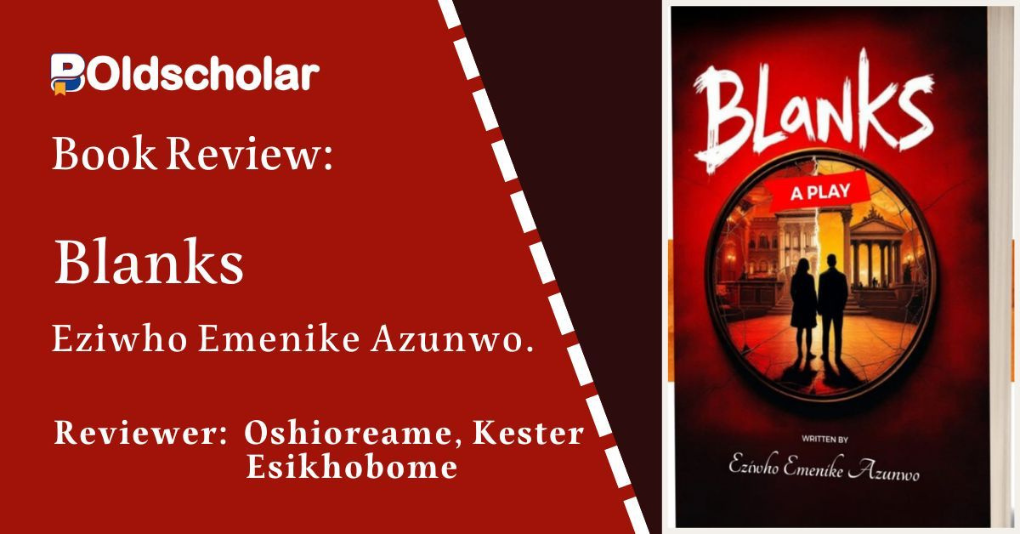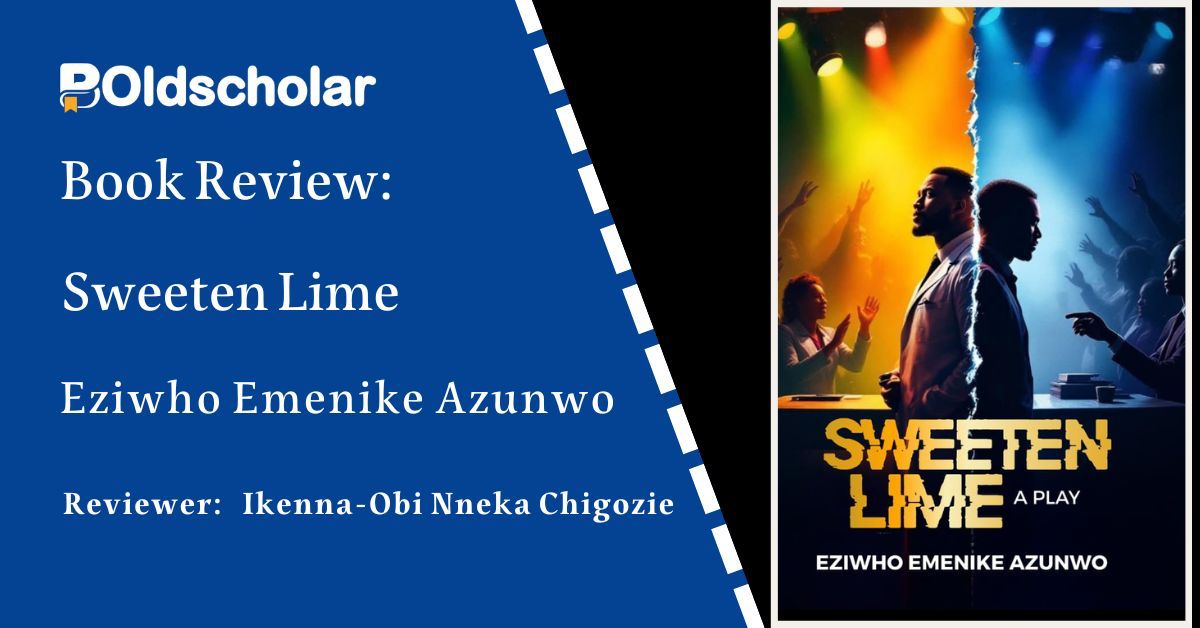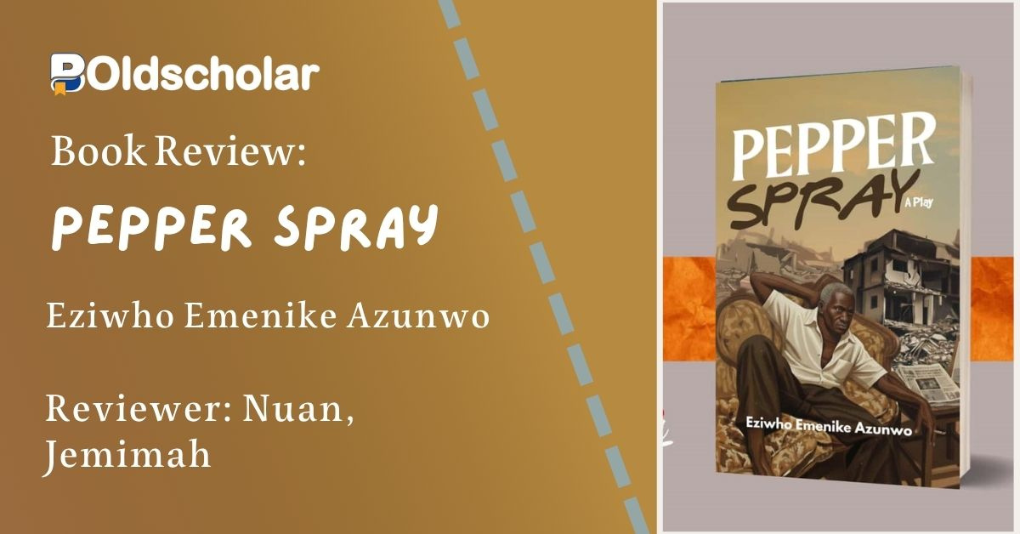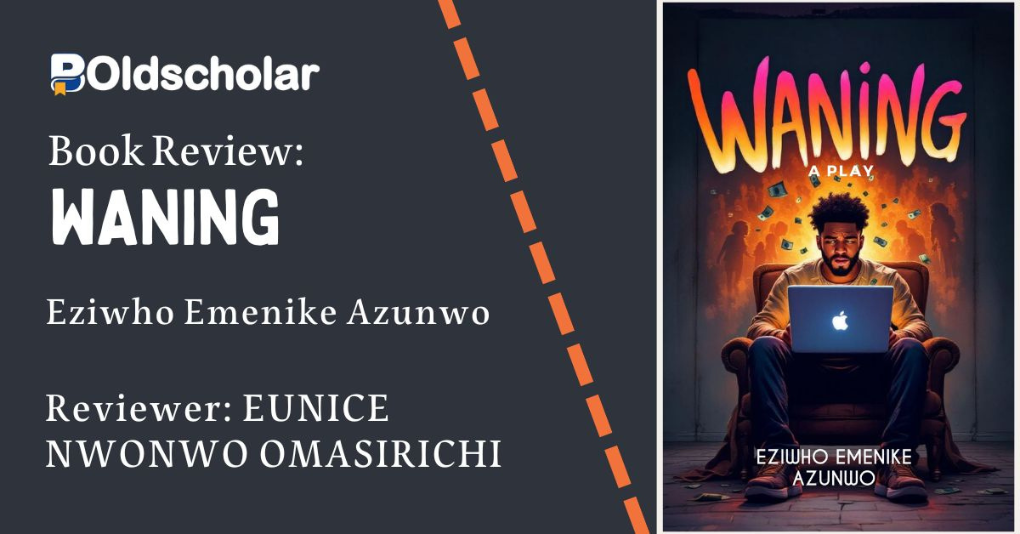Title: Blanks
Genre: Drama
Author: Eziwho Emenike Azunwo
Year of Publication: 2025
Edited & Published in Nigeria by: Covenant Daystar Publishers,
Port Harcourt
Pagination: 64
Reviewer: Oshioreame, Kester Esikhobome
Institution: Rivers State University, Port Harcourt, Department of Theatre and Film studies
Introduction
In Blanks, by Emenike Azunwo, we are reintroduced to marriage as one of the oldest institutions gifted to humankind by the divine. Over the years, it has been significantly influenced by the forces of modernity, globalization, and popular culture. While many scholars argue that marriage primarily serves purposes such as procreation, companionship, and recreation, the concept has evolved beyond its traditional tenets of respect, commitment, love, and submission, raising more questions than there are answers.
For instance, some proponents of the feminist movement view marriage as an institution rooted in equality and liberty, asserting that wives have equal rights with their husbands within the home. They argue that there should not be a clear distinction between the roles of men and women in marriage. This perspective often conflicts with the views of traditional men who believe that the man is the king, master, and ruler of the household, deserving and demanding respect from his wife.
Petiersen (2021) asserts that in marriage women are not seen nor regarded as persons but as their husband’s property, but the men are regarded as persons. Which speaks to overall ownership and control. Chambers (2017) furthers argues that marriage physically and psychologically undermines women’s right to equality with men. More emphatically, the argument about equality of men and women in marriage is described “…as a legally and socially sanctioned institution which continues to benefit men at the expense of women. It is a direct product of patriarchy, and it continues to thrive on it, particularly through the enforcement and maintenance of traditional gender roles where men are expected to be the breadwinners while women do all the housework and childcare” (Uwamariya, 2019). However, Fiberesima (2023) opines that the conflict in the marriage was hinged of cultural differences as opposed to equality but nonetheless the issues of patriarchy comes to play as the man’s ways were in alignment with traditional concept of male gender. In order words, men always act or are positioned as the GOC (General Officer Commanding) the home forces whose orders must be obeyed and without complaint. He has a right, supreme authority to bark orders around the house to the consternation of the feminist wife who sees that attitude as an affront to her desire for equal rights and shared responsibility in the marriage.
Consequently, Mr. Nkparazila and his wife, Mrs. Nkparazila, find themselves entangled in a web of conflicting values, principles, and expectations as a married couple. Importantly, the ensuing conflict cannot be attributed solely to differences in values and principles; the playwright suggests that there is also a lack of preparedness for the journey of marriage. This lack of preparation contributes to conflict and tension within the home. Marriage is not just an event but a long-term journey that requires extensive thought and sincere consideration before committing to it. However, it seems that Mrs. Nkparazila is still enamored with the thrill of single-hood, while Mr. Nkparazila mistakenly believes that being a husband equates to being a commander whose orders must be obeyed without question.
It is clear that the absence of premarital counseling left the couple unprepared. As a result, Barrister Etim, Naomi, and David work diligently to help them understand their roles and expectations as a married couple.
Author’s Bio
Dr. Eziwho Emenike Azunwo, affectionately known as the Academic Rabbi, a luminary in the realm of academia and a beacon of scholarly excellence. As a Senior Lecturer and the Acting Head of the Department of Theatre and Film Studies at the prestigious Rivers State University, Nigeria, Azunwo embodies a profound commitment to education and intellectual inquiry.
Hailing from the picturesque town of Rundele in Emohua LGA of Rivers State, Azunwo's journey in academia has been nothing short of extraordinary. With a wealth of experience garnered over the years, he has served in various capacities, leaving an indelible mark on every institution he graced. From his tenure as a lecturer at the University of Port Harcourt to his current role at Rivers State University, Azunwo has been a catalyst for positive change, shaping the minds of countless students and inspiring the next generation of scholars.
A true Renaissance man, Azunwo's contributions extend far beyond the confines of the classroom. He is a notable Nigerian Playwright with over 60 published plays, a revered Critic, a visionary Theorist, and a prolific Writer, with over 40 articles published in reputable journals. His creative oeuvre includes a captivating array of plays, each a testament to his boundless imagination and artistic prowess. From the poignant drama of "Suffering in Paradise" to the gripping narrative of "The Last Don," Azunwo's works resonate with depth and authenticity, earning him accolades both at home and abroad.
Azunwo's impact transcends borders. His unpublished play, "The Good Man," received a standing ovation in the USA, a testament to his ability to captivate audiences on a global scale. In addition to his artistic endeavors, Azunwo is a dedicated advocate for social change, using his platform to shed light on pressing issues such as women empowerment and domestic violence in Nigerian video films.
Beyond his professional achievements, Azunwo finds strength and joy in his family life. Married to Mrs. Precious Uchechi Azunwo, who is also a lecturer at University of Port Harcourt, their union is blessed with a son and a daughter, forming a foundation of love and support that fuels Azunwo's passion for excellence.
In every facet of his life, Eziwho Emenike Azunwo exemplifies the pursuit of knowledge, the pursuit of art, and the pursuit of a better world. He is not just a scholar; he is a visionary, a trailblazer, and a true icon of academia.
Plot Structure
In the play Blanks, Azunwo adheres to ‘Freytag’s Pyramid’, utilizing the established framework of exposition, rising action, climax, falling action, and resolution to create a compelling narrative arc (Glatch, 2024).
The narrative commences in a barrister's office, where the central characters, Mr. and Mrs. Nkparazila, are engaged in a heated dispute; a gender conflict more like each insistent on their extreme positions in the marital space. It was a masculine versus feminine clash; the male gender insisting on the tenets of tradition which gives the husband supreme authority and control over the woman and the woman on her part is passionate about equal rights and freedom from the controlling influence of the husband. Therein lies the clash between the husband and wife in this play text. The intensity of their argument not only reveals their individual personalities but also highlights the underlying issues that contribute to their conflict:
MR. NKPARAZILA: (Looking up, exasperated, addressing an unseen
force) God, take away this cup from me. This woman I wrongly married
is nothing but disaster!
MRS. NKPARAZILA: (Rolls her eyes, irritated) Do you think God listens
to a fool who had no clue what marriage truly meant? (Azunwo, 2025, p. 16-17).
The husband is portrayed as a narcissist and a staunch traditionalist, who firmly believes that a wife should be totally submitted to her spouse, particularly one who provides for her materially. In contrast, the wife is depicted as educated and independent, advocating strongly for autonomy and resisting her husband's attempts at control in the marital space.
As the plot unfolds, the scene shifts to the couple's living room, where the wife's shortcomings as a homemaker come to the fore. Her lack of attention to cleanliness and organization becomes a source of contention, illustrating her prioritization of personal grooming and appearance over household responsibilities. Tension escalates dramatically when the husband returns home to find the living space in disarray, referring to it disparagingly as a "dump.” The wife, however, remains unperturbed, asserting her identity as a wife rather than a servant, and challenges her husband to address the situation if he is dissatisfied:
MRS. NKPARAZI: (Shrugs) I don’t see anything wrong. Or are my eyes
failing me?
MR. NKPARAZI: (Angrily) You don’t see anything wrong? This place looks like a dump!
MRS. NKPARAZI: (Nonchalantly) Oh, you mean this little mess?
MR. NKPARAZI: (Exasperated) Excuse me?
MRS. NKPARAZI: (Indifferently) Please, honey, I don’t have the strength for this right now. I’m trying to finish my nails, and when they’re dry, I’ll get to the rest (Azunwo, 2025, p. 24).
Meanwhile the altercation and tension experienced here could be attributed to what Travers (2023) calls; “Weaponized/Strategic incompetence” a situation where either partner in a relationship feigns incompetence to avoid engagement in chores, tasks and responsibility in the domestic front in their bid to deliberately make certain domestic tasks gender assigned. Undoubtedly, this creates tension instead of collaboration in the home.
The introduction of Naomi further develops the character of Mrs. Nkparazila. Through their conversation, the audience gains insight into her past and her insistence on maintaining an independent lifestyle despite her marriage. Naomi advises her that the dynamics of marriage necessitate a change in her approach to life, emphasizing that her marital status should not inhibit her enjoyment. This dialogue prompts Mrs. Nkparazila to contemplate the possibility of divorce, a notion that surprises Naomi, while underscoring the complexities of Mrs. Nkparazila’s marriage. To compound the situation, the introduction of David, the husband's friend and their subsequent conversation peels another layer of revelation. The husband deflects responsibility for his marital challenges and instead places the blame on David, who is perceived as more experienced having married earlier. Mr. Nkparazila articulates his grievances, culminating in a pivotal moment when his wife returns home intoxicated with alcoholic beverage at 9:38 PM after socializing with friends. David expresses concern, suggesting that her behavior is inappropriate for a married woman, highlighting her perceived lack of respect for her husband.
The narrative complicates further as it approaches a critical arc when the wife requests financial assistance, which the husband declines, asserting that she is capable of earning her own income. He contends that if she does not show him the respect he deserves as a husband, she should not expect financial support. Resolute in her decision, the wife chooses to seek legal counsel regarding a potential divorce.
The drama concludes in the barrister's office, where the contentious dialogue resumes. Despite the lawyer's efforts to clarify the implications of their divorce decision, both parties remain steadfast in their intentions. During the proceedings, the husband discovers a shocking revelation: his wife has a child from a previous relationship that she did not disclose during their courtship. This new information significantly alters the dynamics of their divorce proceedings, albeit momentarily. The ramifications of the divorce settlement take the husband by surprise, prompting him to exit with a soliloquy expressing his determination to prevent his wife from claiming the wealth he has diligently accumulated over the years.
Characters and Characterization
Mr. Nkparazila serves as a quintessential representation of everything that advocates of feminist ideology reject in men, particularly within the confines of marriage. He is portrayed as a chauvinistic, egotistical, and narcissistic husband who exhibits gas-lighting tendencies when it suits him. His arrogance is apparent in his caustic and acerbic speech. However, his greatest flaw is his refusal to take responsibility for his actions; he prefers to place the blame on his friend David, who introduced him to his wife, rather than accept accountability for his decision to marry her.
It is clear that Mr. Nkparazila fails as a husband, completely lacking problem-solving abilities. Instead of working through the challenges of his barely month-old marriage, he opts for an easy way out by considering divorce. Although he expends effort to earn money to bolster his ego, he neglects to put in the same effort to nurture his marriage. For him, ego takes precedence over companionship.
Conversely, Mrs. Nkparazila emerges as the antagonist, characterized by her intelligence, beauty, and immersion in modern trends. She shows no regard for the dignity expected of a married woman and behaves as though she respects neither her home nor her marriage. Her inability to detach from the temptations of single-hood reflects her profound immaturity. Mrs. Nkparazila places her personal freedom above respect for her husband and the obligations of matrimony. Her actions and words betray her lack of preparation for marriage; she enters it without a purposeful vision. Rather than investing in her home, she prioritizes social outings with friends and indulgent drinking, undermining the sanctity of her marriage. Her arrogance prevents her from seeking or accepting wise counsel, especially from Naomi and Barrister Etim. In comparison, Mrs. Nkparazila is in many respects like Tayo in Wale Ogunyemi’s The Divorce, Tayo is portrayed as a defiant and disrespectful wife who is prone to domestic violence. Imagine her response to Sanmi’s anger over her decision to stay back at a party when the husband left for the house, she responds to the husband’s order with an audacious and emphatic insult; Tayo: “You are mad” (Ogunyemi, 1977, p.5). She projects her independence further when she, in defiance counters her husband’s attempt to put a boundary on her freedom of movement by this response; “Is this a kind of hypnotism or what? It will not work on me I shall go out again tomorrow, next week, next month; Anytime I like if you think I’m a puppet you can manipulate” (Ogunyemi, 1977, p. 5). However, unlike Mrs. Nkparazila, Tayo is a physically violent wife who slaps the husband at the slightest provocation (Ogunyemi, 1977,).
Barrister Etim stands as the definitive voice of reason in this narrative similar to the role of Patrick in Ogunyemi’s The Divorce (Ogunyemi, 1977, p. 59). He takes on the role of counselor and therapist for the couple, stepping beyond his obligations as their legal representative. His commitment to remedying a failing marriage fuels this proactive role. He embodies compassionate humanity, offering his expertise pro bono. Mr. Etim remains an unwavering optimist, championing hope amid dire circumstances. As a lawyer, he is driven by a genuine desire to see his clients thrive in their marital pursuits, exceeding the limits of conventional legal representation. He presents all aspects clearly and straightforwardly, empowering his clients to make informed decisions about their futures.
Naomi and David are exemplary friends who provide honest and thoughtful counsel to those grappling with marital issues. They remain free of judgment, delivering the truth with kindness to those who need it most.
Thematic Concerns
The author explores themes that are relevant to individuals within the social context, particularly concerning societal perceptions of marriage. One prominent theme in the play is male chauvinism, as illustrated by the protagonist's interactions with his wife. Conversely, feminine pride is depicted through the character of Mrs. Nkparazila, who firmly asserts her rights and resists her husband’s demands.
The lack of premarital counseling significantly contributed to the conflicts experienced in their marriage. They engaged in issues that could have been addressed beforehand. Mr. Nkparazila highlights this reality when he confesses, "I married her because she was charming and educated! She acted like the perfect wife. Was I supposed to wait three more years to figure out she was pretending?" (Azunwo, p. 47).
Additionally, one of the challenges in their marriage arose from unrealistic expectations, which proper counseling might have revealed. Parenting deficiencies are evident in Mrs. Nkparazila, as she appears unprepared for marriage due to inadequate upbringing. Other notable themes include the dangers of assumptions, cultural conflicts between modern and traditional views on marriage, the absence of vision, misplaced priorities, role changes, responsibilities, independence, difficulties in severing ties with the past, immaturity, selfishness, gender rivalry, and the struggle for equality.
Dramatic Technique/Style and Language
The use of symbolism begins with the title Blanks, which suggests gaps, a void, and a sense of emptiness. This symbolism reflects how marriage, once a revered institution, is gradually deteriorating, particularly in an era where individuals are increasingly asserting their rights within the marital context. Blanks could represent anything that contradicts the expectations of those involved in marriage. Typically, people enter marriage with the hope of finding fulfillment and enriching their lives; however, many are unwilling to put in the necessary effort to make the marriage successful. Blanks also imply an easy exit at the first sign of trouble rather than concertedly find solutions.
Notably, the author employs simple language that is both clear and rich in symbols and metaphors. This straightforward approach to dialogue makes the author's intentions easily understandable and renders the characters believable. The language aligns well with the characters and enhances their characterization. The author skillfully avoids excessive jargon, such as legal terminology for the lawyer character or complex feminist theories quoted by Mrs. Nkparaliza, which could detract from the narrative.
Conclusion
The playwright in Blanks showcases a profound commitment to social change by confronting a delicate yet pertinent subject that holds immense significance both socially and personally. Across the globe, countless marriages have not only failed but have also left individuals emotionally bruised, while some tragically lead to loss of life. Emenike Azunwo's play delves into these complex issues, bringing to the forefront the often-ignored concerns that, if left unaddressed, can fester, resulting in heightened tensions and situations that spiral out of control.
Premarital counseling emerges as a crucial aspect for couples embarking on the journey of marriage. It is vital that they resist the allure of superficial attractions, such as fleeting charm or physical beauty, which can be deceiving in the long term. For instance, Mr. Nkparazila is initially drawn to his partner's intelligence and looks, yet these superficial qualities fall short when the deeper, more pressing challenges of marital life arise (Azunwo, 2025). This serves as a clear reminder that intending couples should prioritize virtues such as character, integrity, and emotional compatibility over ephemeral traits like charisma or appearance. Ignoring “red flags” before entering marriage can lead to serious repercussions.
As Wollstonecraft notes, “Sculpted by a gender stereotype that their mothers reinforced, girls were brought up to exploit their looks in order to find a man who would support and protect them. Wollstonecraft was the first feminist to describe ‘marriage for support’ as a form of prostitution—a shocking assertion for the time” (Wollstonecraft, as cited in The Feminism Book, 2019, p. 49). This sentiment emphasizes a critical perspective on how societal expectations shape women's role (s) in marriage, suggesting that reliance on physical aesthetics is insufficient for a lasting partnership. This conclusion is more farcical than realistic, as it is not sustainable. Beauty and other external/biological feature decline with age, which should make men focus on more germane matters like purpose, vision, character and values as motivation for marriage.
Furthermore, it appears that Mrs. Nkparazila may have entered her marriage with predetermined expectations of financial support from Mr. Nkparazila. This prompts a crucial examination of her reaction when her husband declined her demands for money, especially considering her been gainfully employed and thus financially independent. It presents a paradox wherein; despite striving for equality and freedom within the marital space, some feminist narratives still appear to defer to traditional gender roles concerning financial dependency on men.
Ultimately, the ongoing discourse surrounding marital conflicts—rooted in the tensions between traditional male dominance and modern feminist ideologies—reflects a broader societal struggle. The clash between contemporary viewpoints on marriage and long-established conventions continues to evolve, suggesting that this debate will remain vital and unresolved for the foreseeable future. It underscores the need for deeper introspection and dialogue regarding the expectations and realities of marriage in today’s society. Again, Ogunyemi (1977, p. 58) re-echoes the sentiment that modernity conflicts traditional values in marriage through the character Patrick; “I know say book don spoil tradition but do that for my village and you will chop sand. Even if you slap am and no body see you, the gods go know.”
It is noteworthy to state that whereas Azunwo’s Blanks bear similarity in narrative and thematic concerns with Ogunyemi’s The Divorce in terms of treatment, Azunwo was able to manage the psychological impulses of his two main characters; Mr. & Mrs. Nkparazila to the extent that their frustration, verbal effusion and marital tension wasn’t allowed to degenerate into physical or domestic abuse even though that has become a burning subject in most modern day marriages. The contrast is however the case in The Divorce where the wife and husband (Tayo & Sanmi) engage in a slap challenge and flinging of whisky glasses at will when provoked. It goes to show that two marriages can experience same challenges but produce different outcomes. This makes for an exciting work of comparative study which is beyond the scope of this paper.
References
Azunwo, E. E. (2025). Blanks. Covenant Daystar Publishers, Nigeria.
Chambers, C. (2017, July). Marriage as a Violation of Equality.
https://doi.org/10.1093/oso/9780198744009.003.0001
Dorling Kindersley Limited. (2019). The Feminism Book: Big Ideas Simply Explained. (Digital Ed.).
Great Britain. https://www.pdfdrive.com/search?q=The+Feminism+Book&pagecount=&pubyear=&searchin=& em=
Feberesima, D. (2023, March 7). Analysis of The divorce of Lawino and Ochol.
https://fiberesima.hashnode.dev/analysis-of-the-divorce-of-lawino-and-ochol
Glatch, Sean. (2024). The 5 Elements of Dramatic Structure: Understanding Freytag’s Pyramid
Retrieved from https://writers.com/freytags-pyramid
Ogunyemi, W. (1977). The Divorce. Onibonoje Press & Book (Industries) Nigeria Limited.
Ibadan.
Pietersen, C. (2021). Women Treated as Property: The Influence of the Ancient Near East on the
Covenant Code. https://orcid.org/0000-0002-3050-589X
Travers, M. (2023, September 18). 2 Ways ‘Weaponized Incompetence’ Might Be Hurting Your Relationship. https://www.forbes.com/sites/traversmark/2023/09/18/2-ways weaponized-incompetence-might-be-hurting-your-relationship/
Uwamariya, O. (2019, February 21). Is Marriage a Punishment for Women?
https://africanfeminism.com/is-marriage-a-punishment-for-women/
Share this post





Be the first to comment on this post